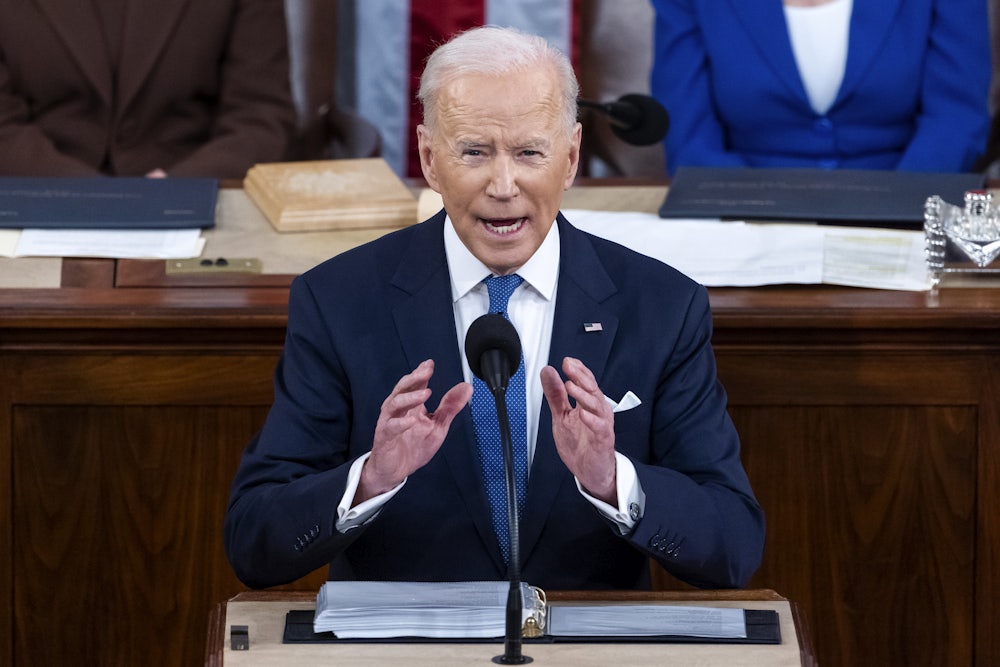When President Joe Biden delivers his second State of the Union speech on Tuesday, it will be his latest, if not the best, opportunity for him to make his argument to the American people that his presidency has materially benefited their lives and thus that he deserves reelection. But recent polling suggests that, no matter how much Biden may tout his administration’s actions, the American people have not registered the impact of his agenda. His task is further complicated by a now-divided Congress, meaning that his greatest accomplishments—which were able to pass under a Democratic majority—are likely behind him.
Congressional Democrats, who shepherded the legislation implementing those big agenda items, thus have the responsibility of forming a Biden defense squad. They will have to find the right balance between trumpeting their legislative achievements and setting expectations for the next two years—which, given Republican control of the House and a Democratic majority in the Senate, will be defined more by gridlock than bipartisan bonhomie. “We are going to hear from the president about the great work that we have done, not just over the last two years, but the work that we expect to do ahead,” said Representative Veronica Escobar in a press conference by the Democratic Policy and Communications Committee previewing Biden’s speech.
A Washington Post-ABC News survey released Monday found that 62 percent of American adults believe the president has accomplished “not very much” or “very little.” While that number is predictably high for Republicans—93 percent say Biden has not accomplished much in office—22 percent of Democrats and 66 percent of independents believe that Biden has accomplished not very much or very little.
Senate Majority Leader Chuck Schumer argued to reporters on Tuesday that the lack of public knowledge may be because “not everybody follows day to day what’s going on in the Senate or what’s going on in the House.” But once the policies from legislation like the bipartisan infrastructure law or the Inflation Reduction Act are implemented, Schumer contended, the American people will be “proud” and “happy.”
Democrats celebrated the passage of some massive bills during last year’s legislative session, but their triumphalism at the time couldn’t change the fact that the measures related to infrastructure or prescription drug prices will take time to go into effect. “I think the president will do a very good job of selling the accomplishments,” Schumer said. “But part of it is a process. You pass legislation; the next day … you don’t have 100 bridges built, or 20 chip tech plants built.”
The Washington Post-ABC News poll also found that 37 percent of U.S. adults approve of the way Biden is handling the economy, and 31 percent have “a great deal” or “a good amount” of confidence in the president to make the right decisions for the country’s future. Those numbers track with a recent CBS News survey, which found that only 38 percent of adults approve of the way Biden is handling the economy and 34 percent approve of how he is handling inflation. Similarly, a Fox News poll showed that 37 percent of registered voters approve of how Biden is handling the economy.
Senator Tim Kaine told me that he believed the “Covid hangover” factored into the negativity. “It’s been a very brutal last couple of years for people. And I almost feel like people are a little bit wary of letting their hopes get up,” Kaine said. “I think [the State of the Union address] is a good opportunity for the president to share the good news but also say, ‘Hey, look, we’ve got more to do.’”
Anytime a president is gearing up for a reelection campaign, it isn’t ideal only to have the confidence of just over a third of Americans—especially when it comes to the public perception of how capable they are to handle economic issues. Biden’s speech on Tuesday will need to plant a seed of assurance in potential voters who are skeptical of his performance that his agenda is working.
Senator Ron Wyden told reporters ahead of Biden’s address that political divisions may account for some of the dissatisfaction, but also argued that the recent midterm elections—in which Democrats performed better than expected—showed that the party’s message was working. “We’ve got a story to tell and we told it pretty well in November,” Wyden said. He added that there is still “lots more to do to cut costs” and address inflation.
Biden has visited several cities recently to tout how signature legislation, like the infrastructure law, will affect everyday Americans. Representative Joe Neguse told reporters on Tuesday that as Biden continues his promotional tour, “you’ll see House Democrats every step of the way as these bills are being implemented.”
Even though this address has a broad reach compared to other presidential speeches, only around 38 million viewers watched last year’s State of the Union. (“It’s not the Super Bowl, but it’s a heck of a lot of people,” Schumer said.) Meanwhile, there are more than 258 million adults in the United States, and more than 154 million voters cast ballots in the 2020 election.
“I think President Biden tonight, and Democrats as we move forward, particularly as we implement these historical accomplishments, are going to be in conversation with the American people,” House Minority Leader Hakeem Jeffries told reporters Tuesday, adding that Democrats must now “communicate effectively” with the public.
That may be a matter of meeting people where they are. When asked how Democrats could better communicate with the public, Representative Abigail Spanberger told me her focus was “talking about the issues that matter to my constituents,” such as inflation and opioid addiction. “I think, generally speaking, the more time we spend listening to our constituents, the more time we spend answering their questions and not telling them what their questions should be, the better,” she said.










